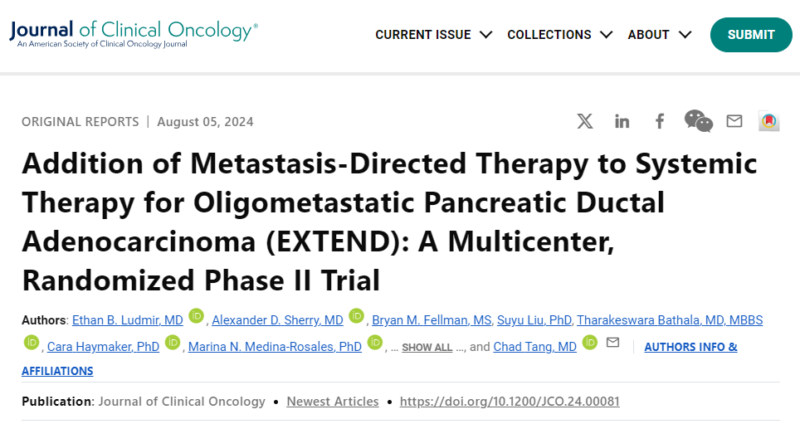Approach achieves some of the longest progression-free survival times reported in a clinical trial for metastatic pancreatic cancer
Researchers from The University of Texas MD Anderson Cancer Center demonstrated that adding metastasis-directed radiation therapy to standard-of-care chemotherapy improved progression-free survival (PFS) in patients with oligometastatic pancreatic cancer. Findings from the multicenter EXTEND trial, published today in the Journal of Clinical Oncology, were first presented at the 2024 ASCO Gastrointestinal Cancers Symposium.
At a median follow-up of 17.3 months, PFS was 10.3 months in patients who received metastasis-directed therapy (MDT) plus chemotherapy compared to only 2.5 months in those who received standard chemotherapy treatment. Additionally, increased immune responses from MDT were connected to longer survival times.
Authors: Ethan B. Ludmir, Alexander D. Sherry, Bryan M. Fellman, Suyu Liu, Tharakeswara Bathala, Cara Haymaker, Marina N. Medina-Rosales, Alexandre Reuben, Emma B. Holliday, Grace L. Smith, Sonal S. Noticewala, Sarah Nicholas, Tracy R. Price, Rachael M. Martin-Paulpeter, Luis A. Perles, Sunyoung S. Lee, Michael S. Lee, Brandon G. Smaglo, Ryan W. Huey, Jason Willis, Dan Zhao, Lorenzo Cohen, Cullen M. Taniguchi, Eugene J. Koay, Matthew H.G. Katz, Robert A. Wolff, Prajnan Das, Shubham Pant, Albert C. Koong and Chad Tang.

“Patients with metastatic pancreatic cancer have limited treatment options and poor outcomes. We are excited to see that the addition of targeted radiation therapy quadrupled the average progression-free survival time, suggesting this approach potentially represents a paradigm shift in treating metastatic pancreatic cancer,” said first author Ethan Ludmir, assistant professor of Gastrointestinal Radiation Oncology.

Metastatic pancreatic cancer spreads rapidly to vital organs, posing significant challenges for disease management. Diagnosis often occurs at an advanced stage, reducing treatment efficacy and decreasing survival rates. The disease’s complexity and resistance to many therapies also contributes to its poor prognosis. Chemotherapy, the main treatment option, generally offers a seven-month average survival time before disease progression.
MDT targets metastases with high-dose ablative radiation therapy, aiming to eliminate all cancer cells at all sites identified on a scan. This approach is primarily being evaluated for patients with oligometastatic disease for whom imaging shows five or fewer metastases. Oligometastatic disease is often described as an intermediate stage of cancer, between a localized tumor and widespread cancer.
MDT has emerged as a major area of research after a successful initial study at MD Anderson in 2016 demonstrated its effectiveness for patients with lung cancer. It has since been shown to be effective in multiple cancer types, including prostate and kidney cancer.
EXTEND is a Phase II randomized basket trial for multiple solid tumors, testing whether MDT plus chemotherapy improves PFS compared with chemotherapy alone for patients with oligometastatic cancer. It is the first randomized trial to specifically evaluate MDT for patients with oligometastatic pancreatic cancer. Between 2019 and 2023, 40 patients with five or fewer metastatic sites were evaluated in the pancreatic cancer basket of the EXTEND trial.
The median time to new lesion recurrence was 14 months in the MDT arm versus five months in the control arm. The 12-month freedom from new lesion recurrence rate was 54% in the MDT arm and 38% in the control arm. Crossover from the control arm to MDT was allowed. MDT, which primarily consisted of high-dose ablative radiation therapy, was very well tolerated, with no grade three or greater adverse events related to MDT observed.
The study’s exploratory endpoints aimed to investigate the effects of MDT on the body’s immune system, following earlier research demonstrating its potential to boost immune response. The researchers found that systemic immune activation events were associated with MDT and correlated with improved PFS.
“The results suggest that metastasis-directed therapy is effective and safe for patients with oligometastatic pancreatic cancer. Nevertheless, larger trials are necessary to confirm the survival advantage observed with metastasis-directed local treatment and to investigate systemic immune activation as a potential mechanism for therapeutic benefits,” said principal investigator Chad Tang associate professor of Radiation Oncology.

Based on these findings, MD Anderson will lead the Phase III EXPAND trial, which will open later this year. The randomized clinical trial will test whether MDT improves both PFS and overall survival for patients with oligometastatic pancreatic cancer. The trial also plans to enroll patients at MD Anderson and certain MD Anderson Cancer Network.
Other posts featuring MD Anderson Cancer Center on OncoDaily.


